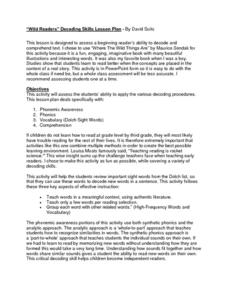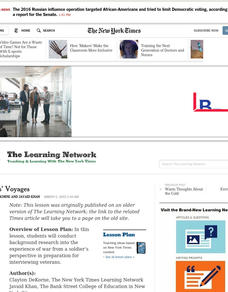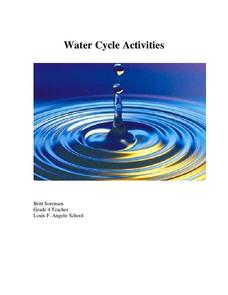Scholastic
Citing Text Evidence
Could you go without your cell phone for 48 hours? Pose this question to your class and then read the article provided here. Pupils mark the text and and complete a graphic organizer that requires the use of textual evidence.
Fluence Learning
Writing About Informational Text: Beyond the Beyond—Galaxies
Everyone has a different point of view, even when it comes to the enormity of the universe. Two separate text passages explain the scope of a galaxy, prompting young readers to write an essay about each author's argument and how the...
Ontario
Sample Guided Reading Lesson for Emergent Readers
Give your guided reading lesson plan a boost with a sample lesson plan designed to reinforce academic content covered in previous assessments. The sample plan describes how the story and activities were chosen and offers the...
Houghton Mifflin Harcourt
Nature: Friend and Foe: Extra Support Lessons (Theme 6)
Breaking down words into syllables has two benefits: it improves vocabulary and it improves understanding of a text. The third and final resource in a series of materials designed to be used with Nature: Friend or Foe offers extra...
David Suits
“Wild Readers” Decoding Skills Lesson Plan
Set young readers on the path toward fluency with this phonemic awareness resource. Based on the award-winning children's book, Where the Wild Things Are, this lesson allows beginning readers to practice isolating...
Curated OER
Altering Text Size, Color, and Font
Students explore computer text. In this word processing and computer lesson, students practice changing color, font, and the size of their text with guided instruction from the teacher.
Curated OER
Main Idea in Informational Text
Readers identify main ideas and supporting details using informational texts. For this literacy lesson, they make predictions and read the text to find the main ideas. They use a table diagram to define the main idea and supporting...
Idaho State Department of Education
Lessons for Social Studies Educators
Point of view, purpose, and tone: three concepts readers of primary and secondary source materials must take into account when examining documents. Class members view a PowerPoint presentation and use the SOAPS strategy to identify an...
Curated OER
Synonyms and Antonyms
Mix up your writing lessons by having kids look at recent newspaper articles instead of their own work. They work in pairs and rewrite sports news articles using synonyms and antonyms for a set number of words. Then they share their work...
EngageNY
Revising for Organization and Style: Bold Beginnings
Get young writers thinking about how to write a great beginning for their narratives. After examining examples of solid beginnings in literary text, young writers discuss the criteria for a compelling introduction. Then, independently,...
EngageNY
Reviewing Conventions and Editing Peers’ Work
Encourage young writers to edit text based on conventions. After reviewing the conventions, fourth graders watch a teacher demonstrate how to revise a paragraph for correct spelling, capitalization, punctuation, or dialogue. Then, pairs...
Curated OER
Exploring Arizona's Biotic Communities Lesson 2: Biotic Communities Vocabulary
Part of a unit on Arizona's biotic communities, this activity focuses on the vocabulary to be used. Terms include biodiversity, topography, desert, hybridization, niche, and more! Youngsters will define these words from contextual...
Core Knowledge Foundation
Unit 1: Contemporary Fiction - They Call Me Güero: A Border Kid’s Poems by David Bowles
They Call Me Güero: A Border Kid's Poems by David Bowles is the focus of a five-week language arts unit unit. Fifth graders listen to various poems and participate in thoughtful discussions, examining vocabulary and learning new words in...
Curated OER
Veterans' Voyages
Introduce your middle and high schoolers to a different perspective on war: that of soldier's. Read Guisseppi Ungaretti's poem "Vigil" to kick-start this instructional activity. After discussing his perspective, read "The Screaming...
Hyperion Publishing
Words We Live By: Your Annotated Guide to the Constitution
The language of the Constitution can feel quite ominous to young learners, but there are a variety of strategies you can utilize to help your class grasp the important concepts and ideals in our nation's founding document. This lesson...
Curated OER
Cooking in Britain Today
Learners explore British cooking vocabulary. In this ELL vocabulary lesson, students identify and describe various foods, match foods with adjectives, discuss their opinions about British cuisine, then read food critic reviews. Four...
National Museum of the American Indian
The A:Shiwi (Zuni) People: A Study in Environment, Adaptation, and Agricultural Practices
Discover the connection of native peoples to their natural world, including cultural and agricultural practices, by studying the Zuni people of the American Southwest. This lesson includes examining a poster's photographs, reading...
EngageNY
Revising for Organization and Style: Exciting Endings
Young writers compose a gripping ending to their historical fiction narratives. Following the previous lesson plan, where learners wrote a bold beginning, class members examine exciting endings from a literary text. They then draft their...
Curated OER
Water Cycle Activities
Explore the water cycle in all aspects with a resource packed full of activities and lessons. The 37-page packet comes with vocabulary, a game, writing prompts, printables, and opportunities to journey through the stages in the water...
Baylor College
Your Energy Needs (BMR)
How many Calories one needs on a daily basis is dependent on a number of factors including gender, height, and activity level. In the third of seven lessons about energy and food, young nutritionists calculate the number of Calories...
Curated OER
CLIL: A Lesson Plan
Students explore Vancouver. In this Vancouver geography and English language building instructional activity, students brainstorm what they know about Vancouver and predict what their text will cover. Students listen to the informational...
Curated OER
Researching Lesson 4
Students explore a "table of contents." In this book researching lesson, students identify common elements of a "table of "contents" and complete a worksheet with questions about this topic.
Curated OER
"Ivan the Fool" Lesson 1
Students in an ESL class read "Ivan the Fool", a folktale from Russia. In groups, they work with their partner to read the material and discuss what they have read. They write down any vocabulary they are unfamiliar with and write a...
Curated OER
Butterfly, Butterfly: Teaching Vocabulary
Kindergarteners practice new words through listening to and reading the science book Butterfly by Jenny Feely. The teacher will first choose words that are essential for understanding the text. Then, using pictures in the text,...























